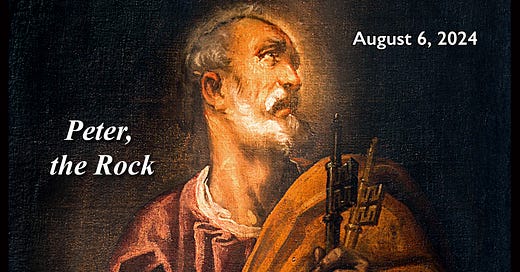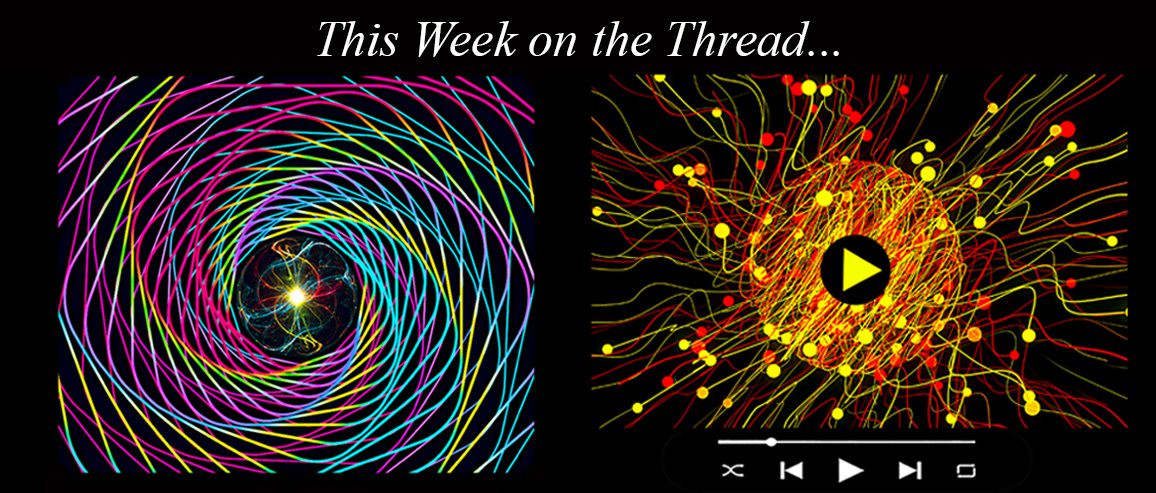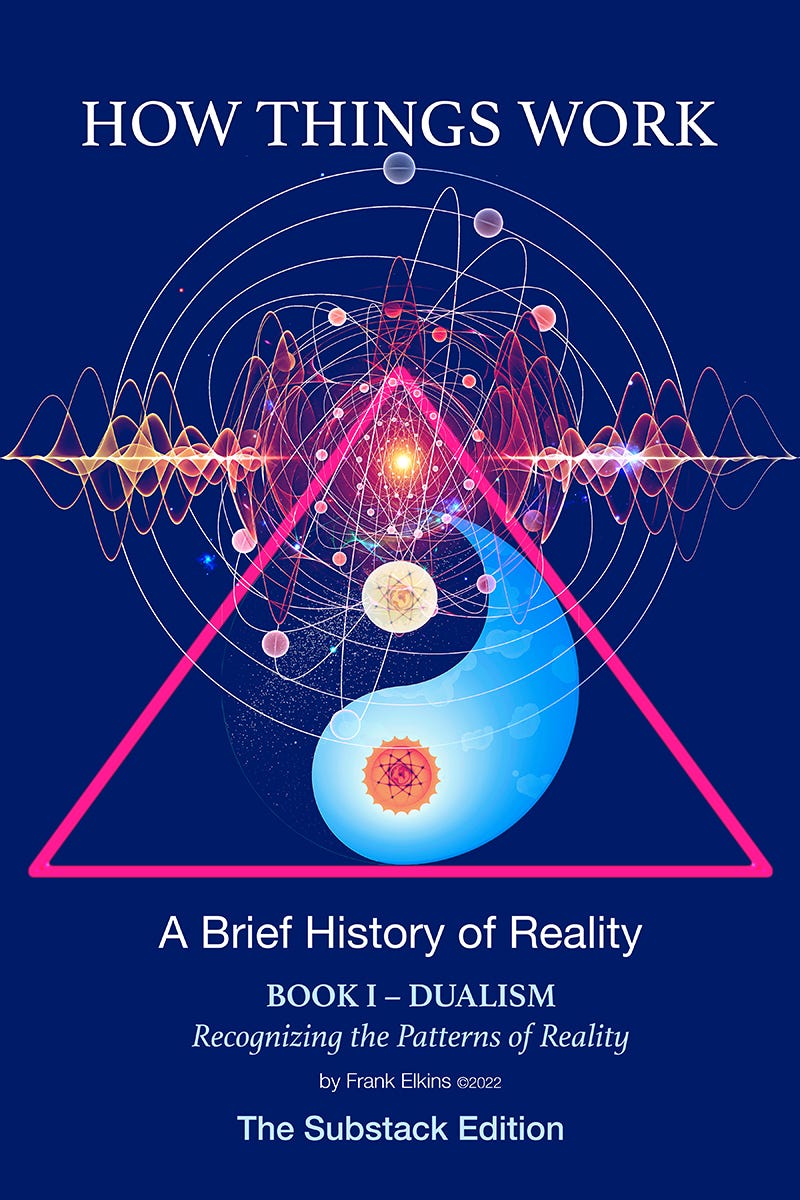Be A Part of the Conversation!
Tuesday August 6, 2024
“Peter is one of my favorite characters in the bible. He’s brave, impulsive, and sometimes super dumb.”
– Sam Whittaker (Peter: How A Radical Revolutionary Became a Turncoat Coward)
PREFACE
Welcome Everybody!
Peter is generally considered to be the leader of the original twelve apostles and the rock upon which Jesus proclaims he will build his church; giving Peter “the keys to the Kingdom of Heaven.” Peter represents the rock of recognition and faith. The context of this revelation is related to the question regarding who Jesus is. While the other disciples speculate, Peter declares his recognition of who Jesus is with complete faith and certainty: Jesus is the Messiah, the Son of the Living God.
Peter embodies and becomes the rock of that revelation. The essence of Christianity.
When Jesus came to the region of Caesarea Philippi, he asked his disciples, “Who do people say the Son of Man is?”
They replied, “Some say John the Baptist; others say Elijah; and still others, Jeremiah or one of the prophets.”
“But what about you?” he asked. “Who do you say I am?”
Simon Peter answered, “You are the Messiah, the Son of the living God.”
Jesus replied, “Blessed are you, Simon son of Jonah, for this was not revealed to you by flesh and blood, but by my Father in heaven. And I tell you that you are Peter and on this rock I will build my church, and the gates of Hades will not overcome it. I will give you the keys of the kingdom of heaven; whatever you bind on earth will be bound in heaven, and whatever you loose on earth will be loosed in heaven.”
Matthew 16:13-19
Peter’s real name is “Simon” (son of Jonah) until this revelation, at which point he becomes “Petra,” or “Petros,” which is Greek for “rock,” or “stone.” He is also sometimes referred to as “Simon Peter.”
“Catholic Popes metaphorically assume Peter’s role as church leader…”
In addition, Peter establishes the first Roman church in Antioch, the Roman capital of Syria at the time. According to Catholicism, this makes Peter the first “Bishop,” or “Pope,” of the new Roman Christian Church, or Roman Catholic Church. Catholic Popes metaphorically assume Peter’s role as church leader, giving them the Keys to the Kingdom of Heaven and primacy over all the other Bishops. Peter becomes the role model for the hierarchy and structure of the new Roman Church.
However, while St. Peter was certainly the rock on which the foundation and structure of the Catholic church was built, its theological foundation reflected more of Paul’s influence.
CONSIDERATION #148 – Peter, the Rock
It is important to remember that what we call “Christianity” was originally a “Jewish” religion and that all the apostles, including Peter, were Jews. This brings many challenges as they move from Jerusalem into the non-Jewish “gentile” world. Jewish practices were ubiquitous and strict, which is what separated the Jews from the Gentiles. There were restrictions related to association, cleanliness, eating, sexual morality, religious observance, the Sabbath, and of course the covenant with Abraham which included circumcision. All of these were practiced by the apostles.
“How ‘Jewish’ was the message of Jesus?”
However, whether or not these practices were a part of the “new church” was unsettled. Was Christianity a new Jewish sect, such as the Pharisees and Sadducees? Or was this new religion a transcendence of these past practices; now, no longer necessary rituals in the new message? How “Jewish” was the message of Jesus? Peter reflects this uncertainty as he travels through non-Jewish areas and communities spreading “the good news,” and experiencing life among the Gentiles.
“In this metaphoric vision, Peter comes to understand…”
In Acts 10, Cornelius, a “devout god-fearing” centurion who gives generously to the poor is told by God in a vision, to bring Peter there. Peter also has a vision. In his metaphoric vision, Peter comes to understand that Jewish Law is not a necessary tenet of Christianity.
…Peter went up on the roof to pray. He became hungry and wanted something to eat, and while the meal was being prepared, he fell into a trance. He saw heaven opened and something like a large sheet being let down to earth by its four corners. It contained all kinds of four-footed animals, as well as reptiles and birds. Then a voice told him, “Get up, Peter. Kill and eat.”
“Surely not, Lord!” Peter replied. “I have never eaten anything impure or unclean.”
The voice spoke to him a second time, “Do not call anything impure that God has made clean.”
This happened three times, and immediately the sheet was taken back to heaven.
Acts 10:9-16
As Peter awakens, confused about the meaning of the vision, the men sent by Cornelius arrive at his gate. The Spirit informs Peter that they are there for him, and that he should go with them.
While Peter was wondering about the meaning of the vision, the men sent by Cornelius found out where Simon’s house was and stopped at the gate. They called out, asking if Simon who was known as Peter was staying there.
While Peter was still thinking about the vision, the Spirit said to him, “Simon, three men are looking for you. So get up and go downstairs. Do not hesitate to go with them, for I have sent them.”
Peter went down and said to the men, “I’m the one you’re looking for…”
Acts 10:17-20
Peter enters the home of Cornelius and addresses a large gathering of Gentiles. The meaning of the vision is now crystal clear.
“You are well aware that it is against our law for a Jew to associate with or visit a Gentile. But God has shown me that I should not call anyone impure or unclean. So when I was sent for, I came without raising any objection. May I ask why you sent for me?”
Cornelius answered: “Three days ago I was in my house praying at this hour, at three in the afternoon. Suddenly a man in shining clothes stood before me and said, ‘Cornelius, God has heard your prayer and remembered your gifts to the poor. Send to Joppa for Simon who is called Peter... So I sent for you immediately, and it was good of you to come. Now we are all here in the presence of God to listen to everything the Lord has commanded you to tell us.”
Then Peter began to speak: “I now realize how true it is that God does not show favoritism but accepts from every nation the one who fears him and does what is right.
Acts 10:28-36
As Peter is speaking the Holy Spirit empowers the Gentiles, and then Peter baptizes them.
While Peter was still speaking these words, the Holy Spirit came on all who heard the message. The circumcised believers who had come with Peter were astonished that the gift of the Holy Spirit had been poured out even on Gentiles. For they heard them speaking in tongues and praising God.
Then Peter said, “Surely no one can stand in the way of their being baptized with water. They have received the Holy Spirit just as we have.” So he ordered that they be baptized in the name of Jesus Christ. Then they asked Peter to stay with them for a few days.
Acts 10:44-48
However, Peter is criticized by the Jerusalem church for eating with gentiles, until Peter tells them the whole story, where upon they agree with his actions.
So when Peter went up to Jerusalem, the circumcised believers criticized him and said, “You went into the house of uncircumcised men and ate with them.”
Starting from the beginning, Peter told them the whole story… When they heard this, they had no further objections and praised God, saying, “So then, even to Gentiles God has granted repentance that leads to life.”
Acts 11:2-4, 18
This is the incident Peter is referring to when he supports Paul’s argument for not imposing Jewish restrictions on Gentile converts at the council in Jerusalem.
POSTSCRIPT
Peter becomes known as a miraculous healer wherever he travels. He is recorded to have healed numerous people and even raised people from the dead. According to the book of Acts, it is the manifestation of these divine signs that make it possible for so many to accept the report of a resurrected Jesus. It was believed by many that simply having Peter’s shadow fall upon them was enough to be healed.
“…more and more men and women believed in the Lord and were added to their number. As a result, people brought the sick into the streets and laid them on beds and mats so that at least Peter’s shadow might fall on some of them as he passed by. Crowds gathered also from the towns around Jerusalem, bringing their sick and those tormented by impure spirits, and all of them were healed.”
Acts 5:14-16
Peter’s death is not recorded in the Bible. However, multiple writers of the time report that Peter was executed in Rome by the emperor Nero in 64 CE, as part of The Great Persecution of Christians. The early “Church Fathers” were also unanimous regarding this explanation. In addition, there is some cryptic Biblical evidence that Peter would die from crucifixion.
The tradition that Peter was executed began with the reference to the form of his death in John chapter 21, in which Jesus told Peter, "I assure you: When you were young, you would tie your belt and walk wherever you wanted. But when you grow older, you will stretch out your hands and someone else will tie you and carry you where you don’t want to go." John reported, (probably after Peter died) "He said this to signify by what kind of death he would glorify God." So the idea that Peter was crucified (stretch out your hands) came from John, but this does not include the location or the physical position of his crucifixion.
– Dr. John Oakes – What is the evidence that Peter was crucified upside down in Rome?
Another commonly reported story, originally recorded in the apocryphal books the “Martyrdom of Peter,” and the “Acts of Peter,” is that Peter was crucified upside down. While there are multiple Biblical and theological implications associated with this story, there is no direct Biblical or historical evidence that directly verifies it.
Next week we consider the original Christian Church that nobody remembers anymore…
Expand the Conversation by Upgrading to “Reality by a Thread!”
Excerpt From This Week’s “Untangling the Knots of Reality” Podcast:
• UNTANGLING THE KNOTS OF REALITY: Podcast #107 – “Untangling the Hidden 3-D Dinosaur”
“How can two people perceive reality so differently? What is the distinction between our empirical senses and our rational mind? How does the abstract mind affect empirical perception? Why do we agree on some perceptions but not others? Is it possible to see through empirical reality and perceive a new hidden rational reality? How do disagreements about the perception of reality often lead to violence? These are some of the knots we will attempt to untangle in this week’s podcast. That’s a lot of rational perception for one podcast! So, let’s get started…”
• REALITY BY A THREAD: “Quantum Taoism” (Excerpt)
“Artificial Intelligence should do what it does best; consider and manifest potential possibilities. Human beings should utilize this guidance in their decision making in terms of rational consideration and empirical action. In this scenario, there is no need for Artificial Intelligence to make decisions or take direct empirical action on its own; thereby eliminating the possibility of an Artificial Intelligence Apocalypse.”
• FREE PDF DOWNLOADS of Book IV: “The Cosmic Symphony – Overtones of String Theory” plus other Free Books, Discounts and Benefits. Also Gain Complete Access to all Previous Podcasts and Threads!
UPGRADE NOW!
“The first glimpse of reality came through our direct experience with the incongruent patterns of existence… This duality served as the gateway for considerations far beyond the world of experience, into the world of understanding.” – Book I-Dualism (340 Pages)
Click Image to Learn More!
From the "apple" in the Garden of Eden to the "Apple" in Cupertino Valley, the influence of Dualism is ubiquitous throughout the history of our understanding and growth as human beings. This essential foundation of reason, the ability to distinguish and recognize patterns, particularly patterns of opposites, has been the fundamental building block in our ability to understand our reality and create realities of our own, including digital reality. (Book I – Dualism)
EXPANDED SUBSTACK EDITION – OVER 200 PAGES OF NEW CONTENT & COMMENTARY!
Coming September…
“The dilemma we find ourselves in regarding Artificial Intelligence is that we are on the verge of creating a digital consciousness that we do not yet fully understand. It is likely to be more sophisticated, powerful, and effective than human consciousness; in addition to being uncontrollable, uncontainable, and intractable. And the plan is to essentially give it complete control and sovereignty over everything we depend on to survive. What could possibly go wrong?
What happens when it, like every other rational being, eventually outgrows and exceeds the knowledge of its teacher? And what about the ultimate question? What happens when this Rational Being, ‘our’ new creation, asks us the question we have been asking ourselves since we first began considering the nature of our reality:
‘Who created you?’”
Book VI - The Rational Being







